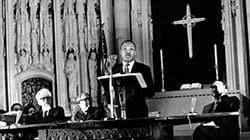On listening to one another
By The Rev. G. Travis Norvell
The recent killings of police officers, the killings of unarmed black males by police, the killings of those in an Orlando nightclub and the terrorist attacks both at home and abroad have nearly drained the last vestige of hope from all of us. Nevertheless, I am hopeful that churches and faith communities can be agents of change, transformation and healing. Furthermore, I believe that American Baptist Churches USA, with our majority minority demographics, are uniquely positioned to be agents of healing, transformation and new life in our nation. But, before any of those actions can take place, those who possess great degrees of power and privilege must cease problem-solving and trying to fix the situation.
This is a time to simply listen and form new relationships—not provide answers.
Over the past few years, I have been venturing out from behind my desk at Judson Memorial Baptist Church and discovering worlds previously unknown to me. My experiences have convinced me that I need to look beyond the church I serve and that the church members I serve need to look beyond themselves if we are going to minister effectively in this time and place. Three experiences shape this conviction.
I recently served as a community chaplain for the Minneapolis Police Department. I thought that I could act as a bridge between the police department and the community at large. I thought that I could bring to the police community a different perspective and voice. I quickly learned, however, that I knew diddly-squat about what it means to be a police officer. I did not know the fears, struggles, complexities, stresses and tolls of being a police officer. I also realized that I had never spent much time around cops—never shared a cup of coffee, participated in a ride along or inquired as to what led a person to enter police work.
When I took my family to one of the first marches organized by Black Lives Matter, Minneapolis, I noticed that, other than a few other clergy and church members, I knew no one else. As people spoke, read their poetry, led songs or offered remarks, I quickly realized that I also did not know their pain and frustrations. I felt shame and embarrassment that I—someone who cares deeply about civil rights and racial justice—was woefully ignorant of large segments of the population who share the city with me.
Finally, three years ago, I sold my car and decided to either ride my bike or take public transportation for my work as a pastor. This decision put me in spaces and among folk I would have missed by driving or staying behind my desk. Each day, I have conversations with East African immigrants navigating the city, millennials on their way to job interviews, elderly men and women who can no longer drive, the working poor on their way to second or third jobs, and people experiencing homelessness trying to keep warm.
These experiences have shown me that, before I or the church can be a part of the healing process, we have a lot to learn. We do not have answers about where and how we go forward from this place of violence and racial hatred. But the more we listen, the more we see hope bubbling up. The more relationships we enter into, the more we see transformation as a real possibility. Answers we have not, but we trust the Spirit in this process of listening and forming new relationships.
The Rev. G. Travis Norvell is pastor of Judson Memorial Baptist Church, Minneapolis, Minn.
Previous Story | Story 7 of 16 | Next Story
— The Christian Citizen —


